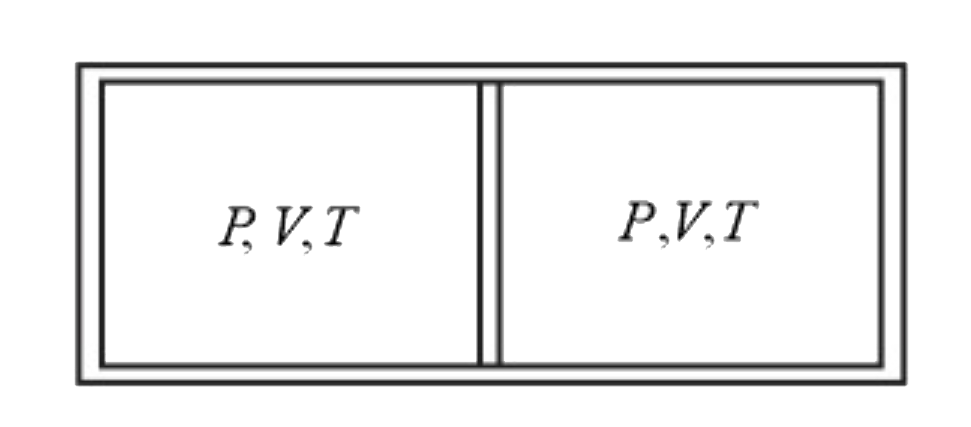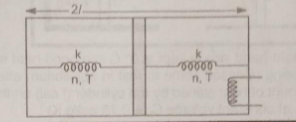A cylindrical vessel made of thermally insulating material is divided into two equal parts by an insulating and. Movable piston. Both parts contain ideal monoatomic gas . The gas in the left part is supplied heat such that the volume of right part becomes one-eight of its initial volume . Work done by the gas in the right part is

−92PV
92PV
−3PV
3PV
The correct Answer is:A
Step by step video, text & image solution for A cylindrical vessel made of thermally insulating material is divided into two equal parts by an insulating and. Movable piston. Both parts contain ideal monoatomic gas . The gas in the left part is supplied heat such that the volume of right part becomes one-eight of its initial volume . Work done by the gas in the right part is by Physics experts to help you in doubts & scoring excellent marks in Class 12 exams.
Updated on:21/07/2023Topper's Solved these Questions
Similar Questions
A cylinderical vessel made of thermally isulating material is divided into two equal parts by an insulating (moveable & smooth) piston. Both parts hae same ideal gas (VpCv=32). The gas in left part is supplied heat such that volume of right part becomes one fourth of initial value.
(PVT,PVT)
(1) In right part, the pressure becomes eight times of its inital value
(2) In right part, the temperature becomes two times
(3) In right part, work done by gas =3PV
(4) In right part, work done by gas=-2PV
View SolutionA vertical cylinder closed at both ends is divided into two parts by a frictionless piston, each part containing one mole of air. At 300K the volume of the upper part is 4 times of the lower part. At what temperature will the volume of the upper part be three times that of the lower part?
View Solution
Knowledge Check
The pressure of an ideal gas varies with volume as P= aV, where a is a constant. One mole of the gas is allowed to undergo expansion such that its volume becomes ‘m’ times its initial volume. The work done by the gas in the process is
AαV2(m2−1)Bα2V22(m2−1)Cα2(m2−1)DαV22(m2−1)A container with rigid walls is covered with perfectly insulating material. The container is divided into two parts by a partition. One part contains a gas while the other is fully evacuated (vacuum). The partition is suddenly removed. The gas rushes to fill the entire volume and comes to equilibrium after a little time. If the gas is not ideal,
Athe initial internal energy of the gas equals its final internal energyBthe initial temperature of the gas equals its final temperatureCthe initial pressure of the gas equals its final pressureDthe initial entropy of the gas equals its final entropy
An horizontal insulated cylindrical vessel of length 2l is separated by a thin insulating piston into two equal parts as shown. Each part contains n moles of an ideal monoatomic gas at temperature T. The piston is connected to end faces of cylinder with help of two springs each of spring constank k. Initially both springs are in relaxed state. The temperature of left part of cylinder is kept constant by some external means while heat is supplied to right part with help of filament. Answer following questions.

If energy Q is supplied to right part so that the piston moves to left by l/4 then change in internal energy of right part of cylinder is
View SolutionA thermally insulated vessel is divided in to two parts by a heat insulating piston which can move in the vessel without the friction. The left part of the vessel contains one mole of an ideal monatomic gas, & the right part is empty. The piston is connected to the right wall of the vessel through a spring whose length in free state is equal to the length of the vessel as shown in the figure. Determine the heat capacity C of the system, neglecting the heat capacity of the vessel, piston and spring.

View SolutionAn horizontal insulated cylindrical vessel of length 2l is separated by a thin insulating piston into two equal parts as shown. Each part contains n moles of an ideal monoatomic gas at temperature T. The piston is connected to end faces of cylinder with help of two springs each of spring constank k. Initially both springs are in relaxed state. The temperature of left part of cylinder is kept constant by some external means while heat is supplied to right part with help of filament. Answer following questions.
temperature of gas in right part in final equilibrium is
View SolutionAn adiabatic vessel of total volume V is divided into two equal parts by a conducting separtor. The is fixed in this position. The part on the left contains one mole of an ideal gas (U=1.5nRT) and the part on the right contains two moles of the same gas. initially, the pressure on each side is p. the system is left for sufficiant time so that a steady state is reached. find (a) the work done by the gas in the left part during the process, (b) the temperature on the two sides in the beginning, (c ) the final common temperature reached by the gases, (d) the heat given to the gas in the right part and (e) the increase in the internal energy of the gas in the left part.
View SolutionAn horizontal insulated cylindrical vessel of length 2l is separated by a thin insulating piston into two equal parts as shown. Each part contains n moles of an ideal monoatomic gas at temperature T. The piston is connected to end faces of cylinder with help of two springs each of spring constank k. Initially both springs are in relaxed state. The temperature of left part of cylinder is kept constant by some external means while heat is supplied to right part with help of filament. Answer following questions.
heat given by left part of cylinder to external arrangement is
View SolutionA vertical cylinder closed at both ends is divided into two parts by a frictionless piston, each part containing one mole of air. At 300K the volume of the upper part is 4 times of the lower part. At what temperature will the volume of the upper part be three times that of the lower part?
View Solution
